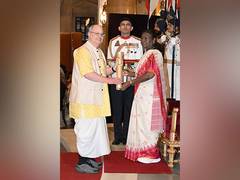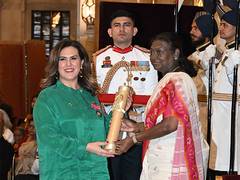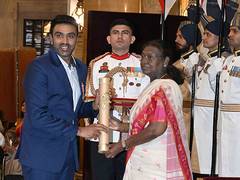Delhi Court fixes Aug 12 for consideration of CBI chargesheet filed against Arvind Kejriwal, others in excise policy case
New Delhi [India], July 30 (ANI): The Rouse Avenue Court on Tuesday fixed August 12 for consideration of the supplementary chargesheet filed by the Central Bureau of Investigation (CBI) against Delhi Chief Minister Arvind Kejriwal and five other accused persons in connection with the excise policy case.
The Special Judge Kaveri Baweja deferred the matter for submissions by CBI on cognizance of the chargesheet.
CBI on Monday filed its final chargesheet in the excise policy case, naming Delhi CM Arvind Kejriwal, Aam Aadmi Party leader Durgesh Pathak, businessman P Sarath Reddy, Vinod Chauhan, Ashish Mathur and Amit Arora, said CBI sources.
On Monday, the Delhi High Court reserved its order on Delhi CM Kejriwal’s regular bail plea in the CBI case related to the excise policy. During the hearing, the Central Bureau of Investigation opposed the bail plea, referring to Kejriwal as the “sutradhar” of the case.
The bench of Justice Neena Bansal Krishna, after noting down the submissions of both sides, reserved the order in the matter.
During the arguments, CBI’s Special Counsel, DP Singh, informed the Delhi High Court that as their investigation progressed, they discovered more evidence implicating Arvind Kejriwal. The chargesheet had been filed today, naming six individuals, including Kejriwal, but five of them have not been arrested.
The CBI informed the Delhi High Court that they had completed their investigation and filed a chargesheet within a month. They claimed that Arvind Kejriwal is the central figure or “sutradhar,” in the excise policy scam. The CBI counsel stated that Arvind Kejriwal, as the head of the cabinet, signed the excise policy, circulated it to his colleagues, and received their signatures within a single day. This occurred during the COVID-19 pandemic.
The CBI counsel further submitted that C Aravind, an IAS officer under Manish Sisodia, testified that Vijay Nair brought a copy of the excise policy to be entered into the computer, and Arvind Kejriwal was present at that time. This, according to the CBI, indicates Kejriwal’s direct involvement in the matter. CBI counsel DP Singh stated that the investigation agency has traced Rs 44 crores of money related to the case, which was sent to Goa. Arvind Kejriwal instructed his candidates not to worry about the funds and to focus on contesting the elections, said Advocate DP Singh
CBI counsel DP Singh argued that while direct evidence might be lacking, witness testimonies, including three witnesses and 164 statements made in court, clearly indicate Kejriwal’s involvement. Singh asserted that such evidence emerged only after Kejriwal’s arrest, as Punjab officers would not have come forward otherwise.
CBI counsel DP Singh stated that after the issue blew up in the media, CM Kejriwal sought ex post facto approval from the council of ministers.
The CBI stated that while certain circumstances allow the High Court to hear bail applications directly, it cannot be the first court for bail hearings. With the final chargesheet now filed, the CBI is prepared for the trial to commence, said Advocate DP Singh, representing CBI
However, Senior Advocate Abhishek Manu Singhvi, representing Arvind Kejriwal, began his submissions by arguing that the case represents an “insurance arrest.” He stated that Kejriwal has been granted bail three times in the ED case. Singhvi also pointed out that since Kejriwal’s arrest by the CBI, there has been no confrontation or new developments. He argued that the distinction between bail and writ petitions does not impact the case’s merit.
Abhishek Manu Singhvi stated that there is no direct evidence against Arvind Kejriwal. He highlighted that the CBI frequently refers to Vijay Nair as a central figure in the case, but Nair had been granted bail in the CBI case a long time ago. Abhishek Manu Singhvi criticised the CBI’s portrayal of Arvind Kejriwal as the “Sutradhar” of the excise policy, arguing that they fail to acknowledge the broader context. He emphasised that the policy was the result of nine inter-ministerial committees, involving officials from various departments, and was published in July 2021 after a year of deliberation.
Senior Advocate Abhishek Manu Singhvi argued that while Arvind Kejriwal signed the excise policy, so did 15 other people, including the Lieutenant Governor.
By the CBI’s logic, the Lieutenant Governor and the 50 bureaucrats, including the Chief Secretary, should also be considered co-accused, said Singhvi. Singhvi also emphasised that he does not wish to implicate the Lieutenant Governor but questioned the CBI’s selective targeting.
Abhishek Manu Singhvi asked the CBI to produce a statement that isn’t based on hearsay, asserting that after two years of investigation, the case relies on presumptions and hypotheses rather than concrete evidence.
Earlier today, CBI filed chargesheet against Arvind Kejriwal and others in the matter
Recently, the Delhi High Court reserved the order on Delhi Chief Minister Arvind Kejriwal’s plea challenging his arrest by the CBI in connection with the excise policy case. The Court also reserved the order on the issue of Kejriwal’s plea for interim bail.
The Delhi Chief Minister had approached the Delhi High Court, stating that applicant/Kejriwal is the National Convenor of a National Political Party (Aam Aadmi Party) and the sitting Chief Minister of Delhi, who is being subjected to gross persecution and harassment for wholly malafide and extraneous considerations, is knocking at the doors of this Court seeking regular bail in this case.
He has recently been approached to challenge his wholly non-est and illegal arrest as well as patently routine remand orders passed by the Trial Court. The said writ petition had come up for hearing before this Court on July 2, when this Court issued notice and listed the matter for hearing on July 17.






